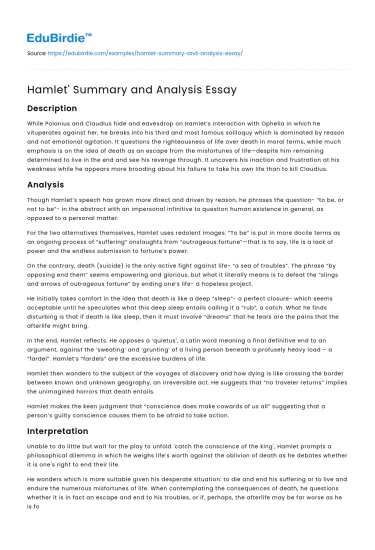Description
While Polonius and Claudius hide and eavesdrop on Hamlet’s interaction with Ophelia in which he vituperates against her, he breaks into his third and most famous soliloquy which is dominated by reason and not emotional agitation. It questions the righteousness of life over death in moral terms, while much emphasis is on the idea of death as an escape from the misfortunes of life—despite him remaining determined to live in the end and see his revenge through. It uncovers his inaction and frustration at his weakness while he appears more brooding about his failure to take his own life than to kill Claudius.
Analysis
Though Hamlet’s speech has grown more direct and driven by reason, he phrases the question- “to be, or not to be”- in the abstract with an impersonal infinitive to question human existence in general, as opposed to a personal matter.
Save your time!
We can take care of your essay
- Proper editing and formatting
- Free revision, title page, and bibliography
- Flexible prices and money-back guarantee
For the two alternatives themselves, Hamlet uses redolent images. “To be” is put in more docile terms as an ongoing process of “suffering” onslaughts from “outrageous fortune”—that is to say, life is a lack of power and the endless submission to fortune’s power.
On the contrary, death (suicide) is the only active fight against life- “a sea of troubles”. The phrase “by opposing end them” seems empowering and glorious, but what it literally means is to defeat the “slings and arrows of outrageous fortune” by ending one’s life- a hopeless project.
He initially takes comfort in the idea that death is like a deep “sleep”- a perfect closure- which seems acceptable until he speculates what this deep sleep entails calling it a “rub”, a catch. What he finds disturbing is that if death is like sleep, then it must involve “dreams” that he fears are the pains that the afterlife might bring.
In the end, Hamlet reflects. He opposes a ‘quietus’, a Latin word meaning a final definitive end to an argument, against the ‘sweating’ and ‘grunting’ of a living person beneath a profusely heavy load – a “fardel”. Hamlet’s “fardels” are the excessive burdens of life.
Hamlet then wanders to the subject of the voyages of discovery and how dying is like crossing the border between known and unknown geography, an irreversible act. He suggests that “no traveler returns” implies the unimagined horrors that death entails.
Hamlet makes the keen judgment that “conscience does make cowards of us all” suggesting that a person’s guilty conscience causes them to be afraid to take action.
Interpretation
Unable to do little but wait for the play to unfold 'catch the conscience of the king', Hamlet prompts a philosophical dilemma in which he weighs life’s worth against the oblivion of death as he debates whether it is one's right to end their life.
He wonders which is more suitable given his desperate situation: to die and end his suffering or to live and endure the numerous misfortunes of life. When contemplating the consequences of death, he questions whether it is in fact an escape and end to his troubles, or if, perhaps, the afterlife may be far worse as he is forced to reflect on the misdeeds and crimes he has committed throughout his life. He turns over the idea of death and questions if it is truly an eternal sleep as it seems or a hellish and unceasing restlessness. Though in death he would not have to watch his uncle reign, he would no longer be obligated to avenge his father’s death and he would no longer have to witness the incestuous relationship between his mother and uncle, his obstacle, like all who contemplate death, is his fear of the unknown.
Thus, Hamlet presents his inability to commit suicide as the result of his apathy from wishing to take on such a fight rather than insufficient desperation. He would rather life becomes a constant decision of whether he will finally arrive at sufficient motivation to end his and/or Claudius’s life than face his fear of the unknown.
This soliloquy explains Hamlet’s dilemma regarding his delay in killing Claudius and fulfilling the revenge of the Ghost, demonstrating the morality of revenge. If he believes that if he decides to murder Claudius, he will die too; he is afraid of death because of its unknown consequences. As a consequence, he is unable to make a decision on whether to act and execute the Ghost's revenge or to endure his sufferings, highlighting the theme of action and inaction.
Judgement
Hamlet's internal conflict regarding existence portrays him as a confused yet mature man who is unable to act as he is unsure of himself and his thoughts waver between the two. Depressed and fed up with everything in the world around him, he contemplates whether or not he should continue or end his own life as well as considers seeking revenge for his father’s death. Hamlet’s raw and unfiltered thoughts about life’s suffocation evoke pathos as the audience pities him and the situation he is facing. Unlike his previous soliloquies that highlighted his frenzied emotions, this one displays his rationality as contemplates and weighs his options and the consequences they entail before making a decision. In this soliloquy, life is burdensome and devoid of power, but there is a sense of agonized frustration that however bad life is, humans, are restricted from doing anything about it by fear of the unknown.






 Stuck on your essay?
Stuck on your essay?

